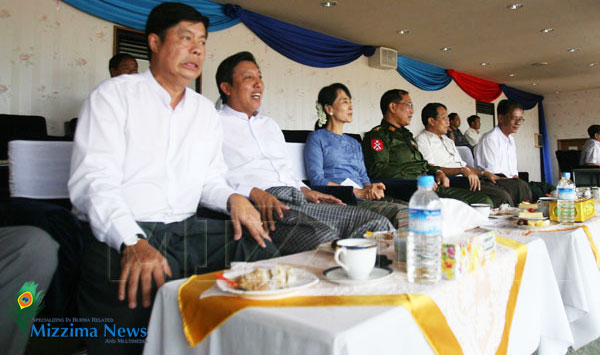There has been several discussions in the media about “cronies”; stories that evolved from Aung San Suu Kyi accepting donations from some influential people at a high-profile education fundraiser.
 There is no doubt the players involved are not going to leave the stage any time soon—they are part and parcel of the infrastructure that the people of Myanmar inherited from the previous military regime, whether they like it or not.
There is no doubt the players involved are not going to leave the stage any time soon—they are part and parcel of the infrastructure that the people of Myanmar inherited from the previous military regime, whether they like it or not.
The big issue is going to be before and after the 2015 general elections. In all democratic countries, because of the nature of multi-party elections, all participating parties have to raise funds in order to run election campaigns, and these campaigns cost money.
The political scenario is not just tied to the election campaign but also on what electoral system Myanmar will employ in 2015. If it is going to be a First-Past-the-Post system, then surely the result will be two major parties, the NLD and USPD, facing each other in Parliament, more or less like in the USA.
And if Suu Kyi becomes President and the NLD are allowed to govern, can it not be presumed that the NLD will already be in the pockets of the military cronies? And what favors will the business tycoon cronies expect in return for their generosity, as a reward for furnishing the NLD's campaign war chest?
Consider for a moment if the government decided to adopt a system of proportional representation (PR).
In the inevitable two-horse race, even if the USDP loses it will still inherit a proportional number of seats, as will the ethnic parties (or coalition) and the smaller democratic parties. A neat and tidy form of power-sharing will be borne when forming the government.
There would automatically be a greater system of checks and balances; no one party would wield complete power nor could it guarantee favors to cronies and major donors.
We can see in neighboring Thailand where the wealthiest business families have every government minister in their pockets, and the economy of the country is practically controlled by their powerful selfish interests. Myanmar needs to avoid similar scenarios developing after the 2015 elections.
In fact the USA is the greatest example of the massive influence of cronies in national politics. When Barack Obama came into power, the Democrats won not just the Presidency but also both the Senate and the Congress. But then the so-called Tea Party began to shift its momentum, bankrolled by wealthy Republicans. The movement became so strong that when the next by-elections took place, several Tea Party representatives were elected, and the Republicans resumed a majority in Congress.
That changed the whole dynamics of the legislature. At every step Obama was opposed by the stronger Republicans and they began to block all critical issues, resulting in congressional gridlocks.
At least Obama got his universal health care bill passed before the Republicans took over the Congress, and millions of uninsured Americans now qualify for health insurance. If Republican candidate Mitt Romney had won that election, Obama's health care plan would have been scrapped.
This is one example of how when only two parties espousing polarized values dominate the Congress, the entire country becomes divided. The result is that passing any law becomes almost impossible. Hence many US political scientists advocate a PR electoral system for emerging democracies.
How will Suu Kyi handle the cronies who attempt to bankroll her campaign for the 2015 general elections? Will she be able to stem their influence after the elections?
It is not enough for her to say that the cronies' wealth should be used for good purposes. But what if these good purposes fall victim to a ball of strings attached?



